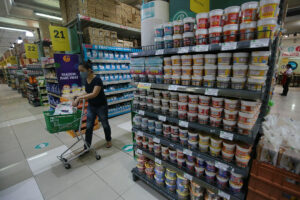Confidence in rising incomes, inflation worries among the main findings of consumer survey

HOPES for rising incomes this year as well as concern over rising inflation were the main findings of a survey on consumer sentiment conducted by TransUnion, a US credit reporting agency.
“Consumers’ mixed sentiments reflect the complex dynamics facing the Philippines along with many other nations, as the world continues to recover from more than two years of disruptions,” TransUnion Philippines Chief Operating Officer Amrita Mitra said in a statement.
The survey found that household finances remained stable as more respondents reported same or increased income and same or improved financial situations.
The survey found that 75% of respondents reported that their household finances were as expected or better than expected in the fourth quarter.
“The improving economy and employment also bolstered the consumer outlook, with an increased number of respondents anticipating future income growth and ability to pay loans and bills,” TransUnion said.
Some 80% of respondents said they expect their income to increase in the next 12 months and 57% expressed confidence in their ability to pay bills and loans.
“Consumer sentiment improved in the favorable economic environment, evidenced by a higher percentage of respondents being optimistic about the future of their household finances,” TransUnion said.
“These findings are buoyed by stronger-than-expected GDP growth and rising employment after the country lifted nearly all COVID-19 restrictions,” it added.
However, respondents said they plan to cut back on some spending to deal with rising inflation.
“Inflation remained the top concern for the fourth consecutive quarter. In the fourth quarter, 82% of respondents expressed they were ‘very or extremely concerned’ about the rate of inflation,” the study found.
Headline inflation surged to 8.1% in December, bringing average inflation in 2022 to 5.8%, the highest in 14 years.
Respondents also said they were “more cautious about future spending,” which was reflected in an anticipated reduction in discretionary spending, digital subscriptions, and medical care or services in the next three months.
“Filipinos are, on one hand, bullish on their household income on the back of strong growth momentum and a growing job market in the past year. On the other hand… high inflation and rising interest rates… will continue to weigh on the national economic outlook and consumer spending,” Ms. Mitra added.
The study also found less optimism about the wider economic outlook. Almost half or 42% expect the Philippines to go into recession in 2023.
When asked about how they plan to deal with a potential economic slowdown, around three-quarters of the respondents said they will cut back on spending (72%) and build up savings (69%).
“Across generations, the youngest group, Generation Z, appears to have the highest appetite for savings (74%) but the lowest desire for reducing spending (65%). In contrast, baby boomers are least keen on savings (49%), and Generation X are the most open to reducing spending (78%),” it added.
TransUnion said that more consumers are seeking new credit but cited lack of access and rising interest rates as obstacles.
“Surging inflation may have given rise to increased demand for new credit. The percentage of consumers seeking new credit has risen for four consecutive quarters. Among those wanting new credit, an increased percentage of respondents expressed interests in personal loans and lines of credit instead of credit cards,” it said.
“However, rising interest rates were indicated as a key factor affecting their decisions regarding whether or not to apply for new credit,” it added.
The study surveyed 1,005 consumers in the Philippines between Nov. 3 and 15. Respondents classified as Generation Z are those born between 1995 and 2004; millennials between 1980 and 1994; Generation X between 1965 and 1979; and baby boomers 1944 and 1964. — Luisa Maria Jacinta C. Jocson




